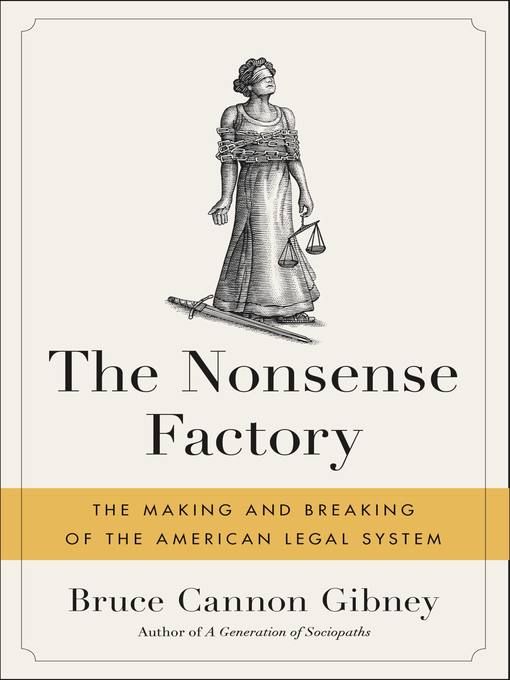
The Nonsense Factory
The Making and Breaking of the American Legal System
فرمت کتاب
ebook
تاریخ انتشار
2019
نویسنده
Bruce Cannon Gibneyناشر
Hachette Booksشابک
9780316475259
کتاب های مرتبط
- اطلاعات
- نقد و بررسی
- دیدگاه کاربران
نقد و بررسی

March 15, 2019
A sweeping, vituperative examination of how the United States, a nation that prides itself on the rule of law, has devolved into an essentially lawless country."It's not only possible, but likely, that all three branches of government are controlled by criminals," writes Gibney (A Generation of Sociopaths: How the Baby Boomers Betrayed America, 2017), a former lawyer who is now a venture capitalist. "At a minimum, it cannot be proved otherwise, for the simple reason that no one truly knows what the criminal laws of the United States contain. The U.S. Department of Justice, charged with enforcing federal criminal law, can't even count the number of criminal provisions." Consequently, most nonlawyer citizens--and even many lawyers--cannot know precisely when they have crossed the line into criminal activity. In the early portion of his outside-the-box yet cohesive diatribe, the author constructs a philosophical foundation for his thesis. Then, chapter by chapter, he eviscerates the American criminal justice system, including police, prosecutors, public defenders, private defense attorneys, law professors, and judges. Gibney also focuses his penetrating gaze on the maze of noncriminal law, slamming arbitrary presidential powers, executive branch rule-making, trial and appellate courts, and the privatized proceedings known as arbitration. Regarding the presidency, he writes, "the greater executive power becomes, the larger the possibility for error. After decades of expansion, the presidency has become a near-impossible job, reposed in one beleaguered and often unstable person." Throughout the readable text, the author illustrates his criticisms by skillfully employing relevant analogies and metaphors, and his humor is subtle and mostly effective. Defenders of the alleged rule of law in the U.S. often point to the concept of American exceptionalism; Gibney effectively attacks this idea with examples showing how laws are administered more clearly in other nations. At times, the book is eerily timely, as when the author discusses alleged national emergencies invoked by occupants of the White House.A keen, lively deconstruction of the American legal system's seemingly countless flaws.
COPYRIGHT(2019) Kirkus Reviews, ALL RIGHTS RESERVED.

April 1, 2019
Gibney (A Generation of Sociopaths) boldly declares that these chaotic times have been long-developing in the legal realm. As that system has grown vast and complex, unaccountable public officials and political inertia have proliferated and subverted America's founding principles, says Gibney. Focusing on the federal system, the author begins with discussing how laws function and their limits. Using legal analysis, statistics, and prior research, chapters cover the major actors and institutions that comprise America's legal system including a scorching critique of law schools. Reasons for a dysfunctional Congress are also explored. Criticisms of the judiciary include its "robotic" dependence on guidelines and threats to its integrity from arbitration laws. Prosecutorial concerns such as excessive plea-bargaining are noted, along with the abuses of an increasingly paramilitary police establishment. A timely investigation of the "Imperial Presidency" considers the history and dangers of executive power. Ultimately, Gibney calls for structural reform and corrective actions. Broader in scope, this could supplement Preet Bharara's Doing Justice. VERDICT Civic-minded readers and fans of movies such as Vice will enjoy this ambitious and wry polemic on America's legal system.--Antoinette Brinkman, formerly with Southwest Indiana Mental Health Ctr. Lib., Evansville
Copyright 2019 Library Journal, LLC Used with permission.

April 15, 2019
Lawyer and venture capitalist Gibney (A Generation of Sociopaths) takes the measure of the American legal system and finds it wanting. He systematically eviscerates virtually every aspect of it, including Congress, which he contends operates with “the efficiency of a Bourbon court”; law schools that fail to prepare their students to become lawyers; the cost of legal representation that makes it far outside the reach of many Americans; a criminal justice system that has criminalized poverty and fueled massive incarceration; mandatory arbitration clauses that allow corporations to take advantage of consumers and hamstring class action lawsuits; and the legal system’s failure to adequately ensure the accountability of America’s police forces. The most threatening development of all, he argues, is the growth of a “unitary executive” branch, the consequence of Congress ceding too much of its responsibility, including declaring war and crafting budgets. Gibney concludes with the admonition that the “law is bad, but not that bad, yet” and offers a few potential curative courses: one is for Congress to reclaim its fundamental powers, and a second is for voters to exercise their franchise and vote for politicians who understand their responsibility to govern. Gibney is sometimes glib but often funny, and his criticisms are serious, well-argued, and provocative. Agent: Paul Lucas, Janklow & Nesbit Associates.

























دیدگاه کاربران